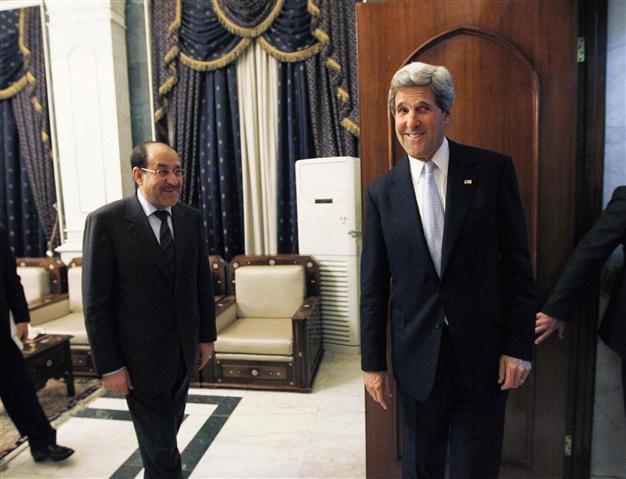Iraq PM softens tone on Turkey, says rapprochement welcome
BAGHDAD - Reuters

U.S. Secretary of State John Kerry (R) meets with Iraq's Prime Minister Nouri al-Maliki and other government officials in Baghdad March 24. Al-Maliki said on April 5 that he would welcome rapprochement with Ankara, two days before Kerry's second visit to Turkey. REUTERS photo
Iraqi Prime Minister Nuri al-Maliki said on April 5 he would welcome rapprochement with Turkey, softening months of hostile rhetoric fuelled by Ankara's engagement with Iraq's autonomous Kurdistan region.
Resource-hungry Turkey has antagonised Baghdad by courting Iraqi Kurds, who are at loggerheads with the central government over how to exploit the country's oil reserves and share the revenues.
Ankara and the Kurdistan Regional Government (KRG) have been negotiating an energy deal ranging from exploration to export since last year.
Officials and industry sources say there have been efforts behind the scenes to reconcile Baghdad and Ankara at the insistence of the United States, which fears a Turk-Kurd energy partnership could precipitate the break-up of Iraq.
"Iraq welcomes any step towards rapprochement with Turkey on the basis of shared interests, mutual respect and good-neighbourliness," Maliki said in a statement posted on his website.
Baghdad says it alone has the authority to control export of the world's fourth largest oil reserves, while the Kurds say their right to do so is enshrined in Iraq's federal constitution, drawn up following the U.S.-led invasion of 2003.
Kurdish crude used to flow through a Baghdad-controlled pipeline running from Kirkuk to the Turkish port of Ceyhan, but exports via that pipeline dried up last December due to a row over payment.
The KRG is now shipping small volumes of crude oil by truck to Turkey and is pressing ahead with plans to build its own export pipeline -- moves that have prompted Baghdad to accuse Ankara of complicity in "smuggling" Iraqi oil.
In an interview on April 4, Turkey's energy minister suggested "a structure" whereby Ankara would play an active role in distributing Iraqi oil revenues fairly.
"We accept that any revenue that reaches any region of Iraq belongs to the whole of Iraq and this is also the correct thing," Taner Yildiz said. "With everything we do we have to pay attention to the sensitivities of the Iraqi central government."
Besides the spat over oil, Maliki and his Turkish counterpart have also traded barbs for inciting sectarian tensions and summoned each others' ambassadors in tit-for-tat manoeuvres.
"There are contacts," Iraq's Foreign Minister Hoshyar Zebari told Reuters in an interview on the sidelines of a conference in the Kurdish region's city of Suleimaniyah in March.
Zebari said a meeting between Maliki and Turkish President Abdullah Gul had almost materialised in Cairo, but was scuppered at the last minute.
Asked whether improved relations between Ankara and Baghdad would come at Kurdistan's expense, Zebari said: "No ... as long as they are working and dealing within the Iraqi legal framework and constitution, it shouldn't be affected."
